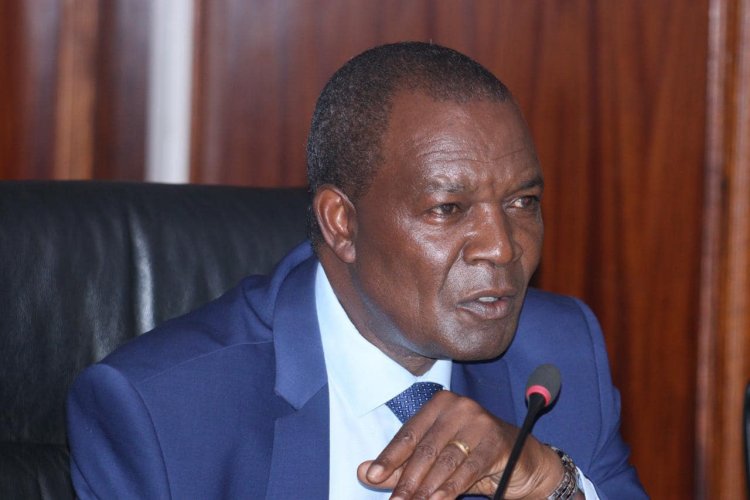What KRA's Unlimited Access To Bank, School, Mobile, NTSA Data Could Mean For You
Treasury Cabinet Secretary Njuguna Ndung’u seeks to amend the Data Protection Act, 2019, via the Finance Bill 2024, which would grant KRA unrestricted access to information from various entities without a court warrant.

The National Treasury is seeking to grant the Kenya Revenue Authority (KRA) access to sensitive personal data, including property and bank account details, in its fight against tax evasion.
Treasury Cabinet Secretary Njuguna Ndung’u seeks to amend the Data Protection Act, 2019, via the Finance Bill 2024, which would grant KRA unrestricted access to information from various entities without a court warrant.
This amendment would integrate data from banks, telecoms, utilities, schools, land registries, and other agencies into KRA's digital system, iTax, sparking concerns among legal experts.
The Finance Bill 2024 suggests altering Section 51(2) of the Data Protection Act to permit the disclosure of personal data for tax assessment, enforcement, or collection without a court order.

Treasury CS Njuguna Ndung'u appearing before the National Assembly Departmental Committee on Finance and National Planning on December 6, 2023. /PARLIAMENT OF KENYA
While the Act currently allows data sharing for personal, household, national security, or public interest purposes, KRA aims for expanded access to combat tax evasion, utilizing data from various sources such as bank statements, import records, and utility bills.
“Section 51(2) of the Data Protection Act is amended by inserting the following new paragraph immediately after paragraph (b)—(ba) disclosure is necessary for the assessment, enforcement or collection of any tax or duty under a written tax law,” says the Finance Bill which has been tabled in the National Assembly.
Section 51 (2) of the Data Protection Act 2019 allows data controllers and processors, to share personal data with a third party if it relates to the individual himself purely for personal or household activity and when it is necessary for national security or public interest.
Section 51 (2) (c) also allows for exemption if the disclosure is required by or under any written law or by an order of the court.
However, the KRA does not prefer using this provision in pursuing unpaid taxes and instead wants to leverage on increased use of data and linkages between the KRA’s systems with third parties such as banks and mobile money platforms to spy on taxpayers’ activities, use of Internet-enabled cameras at excisable goods processing plants and full rollout of digital electronic tax registers (ETRs) to grow revenue.
In simple terms, here's what such an amendment could mean for Kenyans:
Privacy Concerns
The most immediate concern for taxpayers revolves around privacy. The risk of data misuse or breaches escalates with broader access to detailed financial data, including bank transactions, property holdings, and other sensitive information.
Taxpayers could find their financial details exposed not just to tax officials but potentially to unauthorized parties, should data security measures fail, with the possibility of such breaches causing anxiety about financial security and personal privacy among the general population.
Risk of Data Misuse
Even with stringent protocols, the increased handling of data heightens the risk of misuse, with possible situations arising where data is accessed for purposes other than tax collection, whether inadvertently or through deliberate actions.
This situation could lead to a misuse of taxpayer information, potentially leading to harassment or exploitation based on financial profiles.
Increased Tax Compliance and Revenue
However, KRA’s access to more comprehensive data could significantly enhance its ability to identify and address tax evasion.
By closing loopholes and tracking high-value transactions more effectively, the KRA could potentially increase tax compliance substantially. This would not only bolster the county’s revenue but also ensure a fairer tax system where high earners and large corporations contribute their rightful share.
Reduction in Tax Evasion
With enhanced access to data, the KRA could more effectively pinpoint discrepancies in tax filings and uncover hidden assets or undeclared income, a move that could curb tax evasion, leading to a more equitable distribution of tax responsibilities and reducing the burden on compliant taxpayers.
Legal Implications
Legally, granting the KRA such exemptions could set a precedent that might encourage other governmental agencies to seek similar relaxations in data protection laws, but could gradually erode the robustness of the Data Protection Act, potentially diluting its effectiveness in safeguarding personal data against misuse.
It might also lead to increased legal challenges as individuals and organizations could contest these exemptions on the grounds of privacy rights and constitutional guarantees in court.
Social Implications
This could not only damage the relationship between citizens and the government but might also result in lower voluntary compliance with tax obligations as taxpayers may feel vulnerable or unfairly targeted.
Economic Implications
KRA's enhanced access to taxpayer information could lead to more effective tax enforcement and potentially significant revenue increases which can be useful in terms of funding public services such as healthcare, education, and infrastructure development.
It could also help reduce the fiscal deficit and potentially lower the need for borrowing, leading to better financial stability for the country.

A person using their phone. /BBC
The Finance Bill 2024 also proposes amending Section 59A of the Tax Procedures Act to establish a data management and reporting system for electronic documents related to tax transactions.
Non-compliance could result in penalties, aligning with the government's Medium-Term Revenue Strategy aimed at increasing tax collection to Ksh2.95 trillion by the following year.
Kenya's tax collection performance, measured as a proportion of annual economic output, has lagged behind countries like South Africa, prompting the government's focus on enhancing revenue collection mechanisms.






